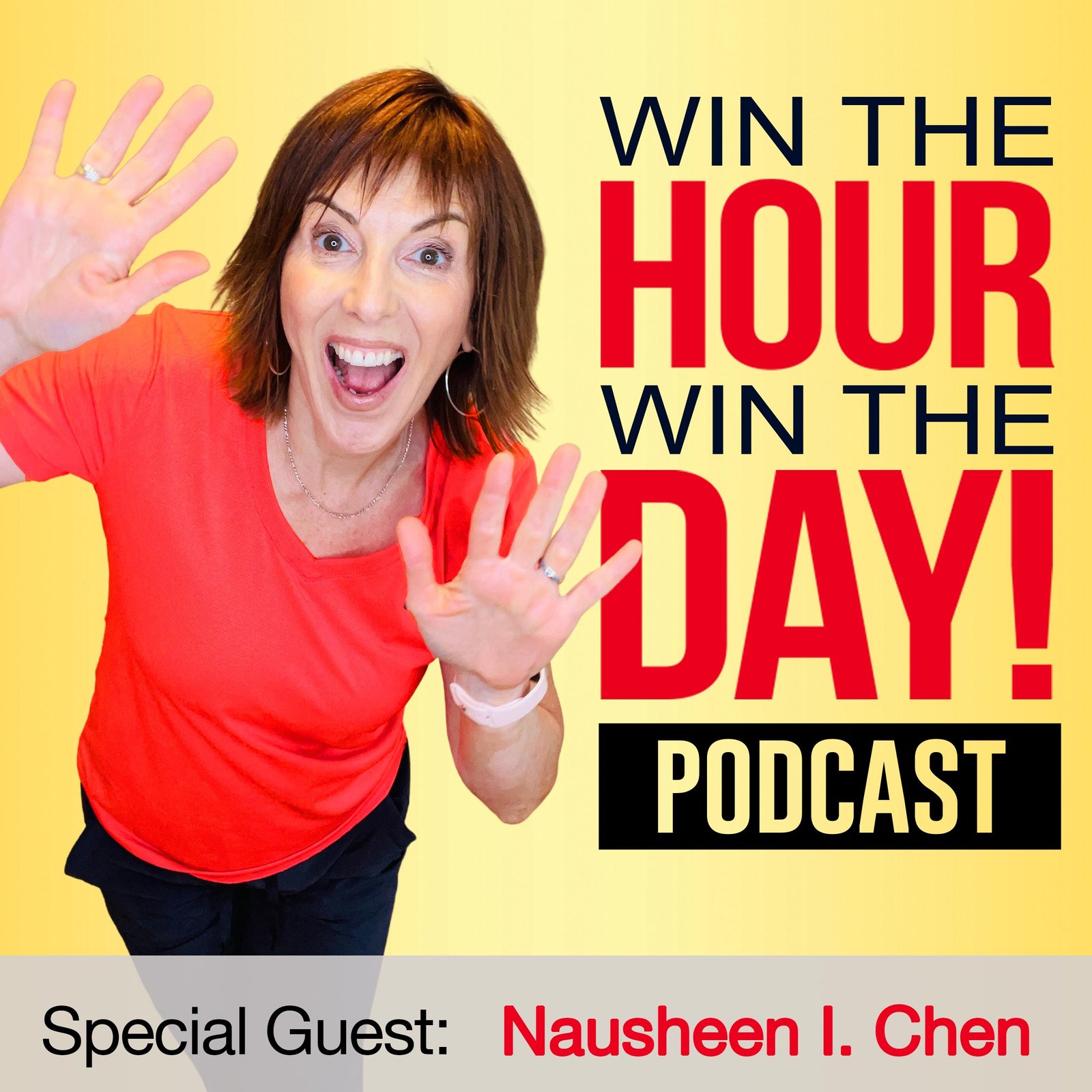Episode Summary This week’s episode of Win The Hour, Win The Day Podcast is...

Are You Ready For Your Next Big Win?
Know your entrepreneur personality and I’ll take it from there!
Recent Podcast Episodes
Preventing Burnout with Smart Work Tools! with Kris Ward
Episode Summary This week’s episode of Win The Hour, Win The Day Podcast is...
Master Social Selling: Heidi Medina’s Strategies for Engagement
Episode Summary This week’s episode of Win The Hour, Win The Day Podcast is...
Boost Productivity and Master Storytelling! with AmondaRose Igoe
Episode Summary This week’s episode of Win The Hour, Win The Day Podcast is...
Master Video Marketing: Top Tips for Entrepreneurs with Dan Bennett
Episode Summary This week’s episode of Win The Hour, Win The Day Podcast is...
Boost Your LinkedIn Strategy with AI Tools for Enhanced Productivity! with Joe Apfelbaum
Episode Summary This week’s episode of Win The Hour, Win The Day Podcast is...
Mastering Personal Branding with NLP Techniques! with Olesija Saue
Episode Summary This week’s episode of Win The Hour, Win The Day Podcast is...
Innovative Lead Generation and Email Automation Secrets with Jennie Wright
Episode Summary This week’s episode of Win The Hour, Win The Day Podcast is...
PR Strategies for Diverse Entrepreneurial Impact! with Jennifer Singh
Episode Summary This week’s episode of Win The Hour, Win The Day Podcast is...
Convert More Clients on LinkedIn with Richard Moore
Episode Summary This week’s episode of Win The Hour, Win The Day Podcast is...
Master Business Growth on Pinterest with Meagan Williamson
Episode Summary This week’s episode of Win The Hour, Win The Day Podcast is...
24/7 Sales Boost: Video Marketing Secrets with Alex Sheridan
Episode Summary This week’s episode of Win The Hour, Win The Day Podcast is...
Master Public Speaking Tips with Nausheen Chen!
Episode Summary This week’s episode of Win The Hour, Win The Day Podcast is...
Beating The Burnout With Connie Whitman’s Success Story
Episode Summary This week’s episode of Win The Hour, Win The Day Podcast interviews,...
Craft Your Social Media Content Strategy With Shannon McKinstrie
Episode Summary This week’s episode of Win The Hour, Win The Day Podcast is...
Boost Your Productivity with AI Tools: A Deep Dive with Erik Fisher
Episode Summary This week’s episode of Win The Hour, Win The Day Podcast is...
Boost Visibility: Repurpose Content and Leverage Podcasts With Christina Lenkowski
Episode Summary This week’s episode of Win The Hour, Win The Day Podcast is...
Master Personal Branding & Storytelling with Lisa McGuire
Episode Summary This week’s episode of Win The Hour, Win The Day Podcast is...
Boost Business on LinkedIn with Catherine B. Roy’s Strategies
Episode Summary This week’s episode of Win The Hour, Win The Day Podcast is...
Scale Your Business: Optimizing Virtual Assistant Services with Kris Ward & Rachel Eubanks
Episode Summary This week’s episode of Win The Hour, Win The Day Podcast is...
Affordable PR Mastery: Crystal Richard Unveils Modern Techniques
Episode Summary This week’s episode of Win The Hour, Win The Day Podcast is...
Mastering Business Storytelling with JJ Peterson’s Guide
Episode Summary This week’s episode of Win The Hour, Win The Day Podcast is...
Revamp Your About Page: Guide to Personal Branding
Episode Summary This week’s episode of Win The Hour, Win The Day Podcast is...
LinkedIn Mastery and Video Marketing Secrets with Alex Sheridan
Episode Summary This week’s episode of Win The Hour, Win The Day Podcast interviews,...
The Systems and Processes Playbook: Insider Secrets to Streamlining Your Small Business with Leah Abunales
Episode Summary This week’s episode of Win The Hour, Win The Day Podcast interviews,...
Maximize Your Business With Chat GPT! with Cory Warfield
Episode Summary
This week’s episode of Win The Hour, Win The Day Podcast is sponsored by Win The Hour, Win The Day’s Signature Coaching Program the Winners Circle. Kris Ward who helps entrepreneurs to stop working so hard interviews, Cory Warfield.
Corey Warfield drops non-stop value bombs!
Forget everything you’ve heard about ChatGPT and AI – this show will blow your mind!
Corey brings us into the world of AI and the amazing future that is now!
Learn:
-How you can get an unfair advantage over your competition with ChatGPT
-Why you want ChatGPT to have your voice and how to do it!
-The easy way to generate and repurpose tons of your content!
And MUCH more!
Scale Your Business Scorecard
https://bit.ly/WinTheHourWinTheDayScoreCard
Win The Hour, Win The Day! www.winthehourwintheday.com
Podcast: Win The Hour, Win The Day Podcast
Facebook: https://www.facebook.com/winthehourwintheday/
LinkedIn: https://www.linkedin.com/company/win-the-hour-win-the-day-podcast
Win The Hour, Win The Day Winners Circle: https://winthehourwintheday.com/winners-circle-masterclass
You can find Cory Warfield at:
LinkedIn: https://www.linkedin.com/in/corywarfield/
Win The Hour Win The Day
https://winthehourwintheday.com
Cory Warfield Podcast Transcription
[00:00:00] Kris Ward: Hey everyone. Welcome to another episode of Win The Hour, Win the Day. And I am your host, Kris Ward. And today in the house we have Cory Warfield and he is a Chat GPT expert.
[00:00:09] Now listen, unless you are living under a rocket, and I don’t know you just came in off maybe a rocket ship from Mars by now you’ve heard about Chat GPT. What we’re gonna talk about today, first, let me stop for a second and welcome you to the show, Cory. Welcome to the show.
[00:00:25] Cory Warfield: Thank you Kris, and thank you everyone for tuning in.
[00:00:28] Kris Ward: Okay. I think this is a fantastically interesting topic because I did not get at all the depth and the scope of the prompts in chat GPT. I think we all said, oh, this is really cool. You key in some information, it’s gonna write something powerfully quick. And do we like it? Do we not like it? Is it too generic?
[00:00:48] Where are we going with that? But you don’t know what you don’t know. And I know for myself, I’ve just been playing around with it. Every time I think, oh, that’s not what I want or do I need a title or do I need to change an ending? I’m really learning the power of the prompts. Like it’s just fascinating to me, and I haven’t done nothing compared to what you’ve done.
[00:01:08] So where do we start? Let’s talk about that. When do we know to use a prompt? Where do we, like, where do we start?
[00:01:15] Cory Warfield: So every time you’re engaging with an Ai, whether it’s a Google bar or an open AI, chat GPT, what you put into it is the prompt. And so what’s coming from the user is prompting whatever the output is from this Ai.
[00:01:31] And I’d love to give the analogy of if any human being were to hire a personal assistant for themself, what they wouldn’t do is walk up to the person, day one, cite unseen, say, “Hey, do this.” Of course you wouldn’t. You’re going to train the person first, and it takes some structure and it takes some background and context and that’s exactly what a chat GPT or an AI can be is your personal assistant. But you need to train it. And through that analogy, if you’re training somebody, you’re not gonna be mean to them. You’re not gonna be short with them. You’re not going to be too presumptuous. You’re gonna be a bit patient, you’re gonna be human.
[00:02:12] You’re gonna try to meet them where they are and that’s exactly how the first step of learning how to promise is something like a chat GPT works is you need to let it know the parameters. So if I wanted to write a book for me, what I don’t do is show up and say, “Hey, write this book for me.” Right? It’s even if 10,000 other people that day have had it write a book for them, which is one of the many use cases people are using it for right now.
[00:02:40] It’s not gonna do a good job unless you tell it to act as a best selling author. All of a sudden, right now, it’s drawing through its hundreds of millions of data points that go through 2021 September. And it’s learning what a bestselling author would say or do, how they would act. So if I wanna write a book about quantum computing, I might say, act as bestselling author with successful books about quantum computing. Please generate a chapter list with creative names. As we, I think
[00:03:19] Kris Ward: oh, okay.
[00:03:19] Cory Warfield: And now it has all of the context it needs. And you might even tell it to write it with a little humor like a Dave Barry. Or you might say, make sure that you’re not using language that will only make sense to a mechanical engineer, right? And all of a sudden, each and every one of these nuances helps it help you better.
[00:03:40] Kris Ward: Oh my gosh okay, hold on. I wanna jump in because you’ve lit up a couple parts of my brain. So one is – a lot of my clients -in the Winners Circle tell us that we help them get 25 hours back a week within the first month of working with us.
[00:03:52] And some of that is what we have, what we call our Super Toolkits. And we help them find and onboard and we will hire for them a VA or outsourcer. And what we do that’s so differently is how we communicate with that person. Cuz I often say in the corporate world, it’s a very parentified system.
[00:04:08] You hire someone, you supervise their work like a parent, child, teacher, student, and it just creates another job. So the communication, you’re right, is exactly what makes us so different and give us such amazing results and a 90% retention rate for our clients. And our clients are so thrilled with the outsources that we get them so affordable, but yet the output is so high, and it’s the structure in how we communicate with them and how we talk to them.
[00:04:32] So that’s huge. So now you’re saying, I think for most of us with chat GPT, you’d think like you give it one command. You know when you ask, “Hey Alexis, what time is it?” You think that’s it. We can’t give a complex command. So right now I’m learning the depth of what you could give it.
[00:04:48] Which kind of now makes me realize too, is like saying, instead of making me dinner, then we take a down notch, “Hey, make me pasta.” Oh, could you make me whatever the lasagna as if you were an Italian grandmother. So going from generic to more and more specific will give us a very different result.
[00:05:10] Cory Warfield: The other thing that compliment that, I don’t know what the percentage is, but I have to presume when we’re in the 80 percentile of people that use chat GPT fall into this trap where it says, I can’t do this. It’ll tell people I am an AI engine that’s trained on data through September of 2021 and I can’t do what you just asked me to do.
[00:05:32] A great example is a financial model, right? If you say, please make me financial projections for my startup, this is our cost of good sold. This is our profit margin. This is our, these are our fixed costs, whatever it is you take all the time to tell it all these things. And then the frustration is it says, oh, I can’t do that.
[00:05:50] The reality is absolutely it can. There’s very little that chat GPT, especially the new chat GPT4. There’s very little it can’t do, but you need to learn your workarounds so you can start telling it things like think like a startup consultant with a degree in finance and help me with my financial projections.
[00:06:10] And you tell ’em all the same data points, and then it might say something like, I can’t give you legal financial projections, but I can give you some examples. Okay we just went from a no to a maybe. So we say, okay, please give me your five year projection as an example. I understand that this isn’t a legal document, or I understand that I can’t give this to a banker.
[00:06:35] And now it says, okay, this person gets it. This person isn’t looking to game the system and then it’ll make your financial.
[00:06:42] Kris Ward: I didn’t even know you could do all that. I just see it as content. I thought it was just content. Content. So you really, truly, it really is like having a conversation with anyone, whoever that person is in front of you.
[00:06:53] We’re assuming that the person in front of you would be a financial expert, but whatever. You can ask it. I did not know that. I just thought it was like, oh, it can write me blogs quick. Whatever, if I do the right prompts wow. And then here’s a silly question because I don’t know. So I did pay for chat GPT, whatever.
[00:07:09] I think they could have come up with a name that rolled off the lips a little bit quicker, but that’s just my personal opinion. I wouldn’t have named it that. So by virtue of that, do I now have four or is that a whole different thing?
[00:07:19] Cory Warfield: If you’re paying for, yeah the $20 a month, then you have access to four just like I do. Okay. Now, when you go in, when you go in at the very top, it’s gonna ask you if you want it to be the legacy 3.5 or the four. Just change it to four. Okay. And one of the things that people are using it for right now, which is prolific, is to do their taxes. Oh, that’s a big one.
[00:07:42] Kris Ward: Dear gosh.
[00:07:42] Cory Warfield: I’ve had a number of people and it’s finding deductions. It is. It’s amazing. At doing taxes. Here’s another thing people are using it for, is to write computer code and deploying that as either mobile apps. So I have a friend, and this is a true story, he had it write a trading bot and he gave it algorithms using the Fibonacci sequence, and he just turned a thousand dollars into, I think it’s 80,000, using this software code that chat GPT wrote him in an afternoon. And this is.
[00:08:16] Kris Ward: I did not know any of that. I thought, cuz the evolution I went through is I had found copy AI and it helped me write little blurbs and make posts a little quicker. So the junior things before chat GPT came out were all, were maybe it’s just the work I do, were content driven.
[00:08:33] I don’t know. So then I just had no idea. I had no idea of the stuff you’re speaking of. I just thought it was to write content. I did taxes. You might as well tell me. I don’t know. It can make my bed now, that’s all I know. Okay. Oh my gosh. Okay so there’s a huge world of prompts then. Like this is the secret.
[00:08:53] The secret is, like I heard something compared to a calculator. . So it makes, it doesn’t eliminate math, but it makes it easier for you and it takes out, the painful mid work, but you still have to know what to key into the calculator. So the prompts are everything
[00:09:09] Cory Warfield: 100%.
[00:09:12] Kris Ward: Okay. All right. So I don’t even know what, I don’t know, so I should just stop talking. Cory, you just take control of the show because I don’t even know, I didn’t know you could do all.
[00:09:20] Cory Warfield: I’ll tell you, and most people don’t, even though we went from, I think I was in one of the first thousand users of the platform the first day it came out, but within the first month at scale to 100 million users.
[00:09:33] Of those a hundred million users, I’m quite certain that 90% are significantly under capitalized on what it can provide. And here’s another example. You can in your content creation example, you can feed it some articles and say, turn this into 20 blogs that will resonate with an audience of people that wanna save more time in their day.
[00:09:56] Ah, and it will take that piece of content and it’ll turn it into 20 blogs. And again, you wanna tell it to act as a blogger, right? You can then go and say, please add a little bit more humor. Please make this a little bit more simplified, you can even tell it’s something like, please keep it between 800 and 1200 character count.
[00:10:16] Or please format it in a way that I can put it directly into an Excel sheet. Anything that you tell it, it can do if you know how to tell it. And so this brings up another point I’ve been talking about a lot on my social channels where I have my little soapbox is people are really worried that AI is gonna take their jobs.
[00:10:35] And one thing we’ve been saying since the day came out, AI won’t take your job, but someone that knows how to use AI might. Every job is going to be enhanced by artificial intelligence, every single job. And so the people that are resisting that are the people that are just thinking you can talk to it like it was a Microsoft product from the nineties are not going to be able to have it do what they need it to do to make them as proficient at their jobs as they should.
[00:11:02] Now with that said, there’s a whole new category and classification of jobs that are being opened up by Ai, and one of those is the prompt engineer. So if you can get it to work with your Excel spreadsheet or your Google sheet, which is very possible, you can now have it start to write programmatically dynamic equations for your spreadsheets or…
[00:11:26] Kris Ward: Okay. So you’re so above me at this point. You’re now looking down from the stars, so hold on, let’s back up for a second for us humanoids that are not there. I thought, listen I’m dabbling with it a little bit. I had written a little story that for my email list, it was something that happened to me when I was a child.
[00:11:43] There was a lesson in there, but when I got to the end of the lesson, I was like, ah, I don’t know if this lesson is a tie down enough for my email, right? So I wrote it and then I copied and paste and put it in chat GPT, and I said, give me a summary and of this story and make it a leader lesson and I thought this is fantastic.
[00:12:02] Look at me. I’m so smart. I had the story, I wrote it out, and then they gave me a good conclusion based on leadership. But I think what’s really hugely impactful, and I really wanna clarify this here because what you’re saying I think has a lot of power to it, is. You can come back if you get the response that you were not necessarily looking for.
[00:12:21] But I think for most of us, we thought it was like ping pong. I put this in, I get this, it’s too generic. I don’t like it. I hit back saying, could you make it more casual? Could you make it shorter? And what you’re saying is, walk in with an effective blueprint for exactly what you want. Please write me a blog that saves, written for entrepreneurs that have been in business at least five years.
[00:12:41] Make it humorous in nature. Don’t use these words cuz I never used them. Focus on these words. Whatever, as much as you can put it in there and then you’re going to get that. So it’s not a ping pong. It’s a really powerful, robust option for us.
[00:12:59] Cory Warfield: You can give it the URL to your book if you’ve got it as an e-copy, and you can then ask it to start writing everything in your tone of voice.
[00:13:07] Kris Ward: Oh, dear Lord. Okay. Okay. Okay. All right. Okay. My voice. Oh my Lord. Okay, so people, smart people like you. Then what’s the next step? How are you gonna continue to teach people like us? Are you gonna have a hundred prompts that you can give? Chat GPT and as a PDF and start working with us.
[00:13:28] Like where does this begin and end? Because I would, yes, I have my book. I have a url. I wouldn’t have thought to do that, or from what I’ve learned from you, I can then say, now break this up into a hundred hosts using my book. Like The Sky’s the Limit.
[00:13:43] Cory Warfield: You can ask it to create a hundred quote cards for Instagram, formatted for a Google sheet.
[00:13:49] You can then put it in a Google sheet. You can then go into Canva. Do a bulk import because Canva plays very nicely with open Ai, and you can have it create a hundred quote cards with quotes that it generated in your voice from your book. They can all go on Instagram. You can then have it write three to five or however many relevant hashtags that’ll increase the probability of going viral.
[00:14:14] And you now within an hour have a hundred pieces of content that all are in your voice that tie into your book that you can use on a social platform to generate any types of conversations, visibility, following anything like that you want. And I’ll get a little bit weird with you for a second, and I’m not the only one saying this, although I’ve been saying this so long that I was really the weirdo when I first started saying this.
[00:14:40] I believe that AI is going to extend the human life expectancy close to a thousand years. A prolific man with a much, much more successful career than I’ve had yet since today that he thinks we’re five years away from AI making humanity immortal. This was a big news story today. I believe that when we combine this with things, the nascent industry of quantum computing, things like nanobots, they’ve now had a solid to liquid nanobot that can go into…
[00:15:07] Kris Ward: Okay, hold on. Cuz you’re talking again way smarter than I am. So are you saying that the AI can give us answers to aging and health problems like that? Give us information.
[00:15:17] Cory Warfield: It can also digest information. So if we have nanobots going through our bodies, it can find early detection of cancer cells
[00:15:25] Kris Ward: Or, oh, see, I keep thinking I keep getting stuck on, I put my content in. It comes out . Okay. Oh my gosh. Oh my gosh. Okay. My head is exploding. Okay, so here’s the other thing. Again, I thought I’m all about systems. I’m all about efficiency. I’m all about saving time. So what I thought. My, somebody on my team, they go maybe whatever, find a blog, an inspiration blog, say, oh, this person’s talking about this, Kris.
[00:15:49] But we could do a better job of it. And then we might take thoughts from that and stick it in chat GPT and say, okay, write me a new article. And then the whole thing was, all I was looking for was to save me steps in the process. Let’s say there’s five steps to writing content. One is the idea and the outline, and then we go into the first draft, blah, blah, blah.
[00:16:07] So if we can compress that and all of a sudden what I’m getting from chat GPT and then I just have to edit it, then great. That just saved me a bunch of time. But that’s really now like saying bicycling is saving me a bunch of time and there’s a freaking car in the garage, right?
[00:16:22] So I thought we were using it. I was pretty impressed with how we were using it. I thought I had it all figured out. But you’re, I could be keen. I do have that book and I do have other blogs. I have all this content that I could be saying this is my tone of voice. Because we do have things like, one thing I will never say is I never tell people to delegate.
[00:16:39] To me, delegating is a lateral move. The work still has to come through you. So there obviously has to be the complaint about chat GPT would be, it’s going to be generic and just say broad sweeping things about productivity that anybody could say. But what we’re learning from you is that’s because you could be giving it 22 prompts and you’re giving it one.
[00:17:01] Cory Warfield: Yes. And I’m about to take this a couple steps deeper than where I start it, but I think I’m gonna blow your mind. You can give it a blog from someone else in your space. And ask it to give you the five reasons or 10 reasons that someone might not resonate with it, or you can. And it will give you the reasons that this might not resonate with the public or why this might not convert to paid clients or discovery calls.
[00:17:29] You can then say, rewrite it in my voice because you’ve already taught it your voice in a way that will dispel all of those. Now, I’ll tell you a few other things that people are using Chat GPT for right now that are mind. If you tell it to act as a therapist, you can have back and forth conversations candidly, and there are people that have augmented and replaced their therapists, psychologists, psychiatrists with chat GPT by and large.
[00:17:55] You can use chat GPT to learn how to interview for a role. You can say you’re a hiring manager at company hiring for this role. Give me an interview, go back and forth the whole interview, and then afterwards you can say, where did I lose you? What should I have said differently? What questions should I have asked you at the end?
[00:18:14] I’m helping sales teams use this to say, here’s my archetype, here’s my offering, here’s my price point. What are the top, what are the top reasons people are gonna say no? And then you go through a whole conversation and say, how do I turn those into yeses or maybes, right? Or how? How do I get them to maybe?
[00:18:30] And from there, how do I increase my probability of getting ’em to a yes? And again, if you have it acting as a sales consult, You can then start segmenting and saying, I’m selling into the manufacturing industry, right? I keep hearing these three reasons that people aren’t buying. Please gimme the psychology, be behind why, and then let’s take it a step deeper and figure out how we can bifurcate that so that this isn’t a pervasive problem in my sales cycle, and it’ll come up with all of that for you as long as you were telling it to act as that type of an expert.
[00:19:07] Kris Ward: Okay. So I think for most of us, we thought it was something that I keyed in and then some magical thing happened where it scraped the internet and gave me summaries and was able to take that information and repurpose it into written content, which I thought was the end of the game.
[00:19:25] And I thought that was fantastic. But you really are talking about it like some space age movie where we are now connected to that big person behind the powerful desk gonna take over the world and they can answer anything like it. It really is. It really is. I know we call it Ai, but I think I was minimizing what that meant.
[00:19:46] I think we need to lean more towards the intelligence. It really is superior, effective, concise, endless intelligence. I didn’t get that. Yeah. Oh my gosh.
[00:20:00] Cory Warfield: And by the way, people are putting digital photorealistic faces to their Ais already, so you can talk to it on even like a Zoom like we’re doing right now.
[00:20:10] There are already capacities to upload images and videos or spreadsheets or infographics. So it is really moving away from text only. There’s a lot of the alternatives to chat GPT and chat GPT4 is starting to roll out in the Microsoft products where you can just talk to it out loud and it’ll understand everything you’re saying and it can even speak back to you in a voice of your choosing.
[00:20:34] Text is, I think, the point of entry for a lot of people. But when you think about a hundred million people are using this every day, it’s getting smarter every single day. And we’ve all seen the different CGIs and the different photorealistic art that’s coming out. When you start marrying all of this together, Google even has a product and as does meadow, which is Facebook, where they’re training robots to be able to not only hold conversations, but do things robotically based on a human prompt.
[00:21:06] It’s light years ahead of use this to write a blog or to steal a journal or something like that. But yet, I think that’s what people are mostly still dipping their toe in the water with.
[00:21:18] Kris Ward: Then don’t you, I mean you seem like a lovely and gentle person, but don’t you then feel like you’re sitting in a room full, a bunch of paste eating kindergartners where we’re over here all excited about, look at the art I made and I’ve got glue in my hand and you’re over here like going, oh my gosh, you silly people.
[00:21:35] There’s all this stuff we can do. I think you’re right. I think. You know the norm. If not, I thought I was ahead of the norm and I wouldn’t even say from what you’re talking about that I’m not even using 1% of it. So that part must be frustrating for someone like you is that we’re light years away from what the rest of us think we like. This is a whole different game.
[00:21:54] Cory Warfield: So I’m not only am I not frustrated, and I think by nature I’m very patient and empathetic, but I think you started the show by saying if people just got off a rocket or if they’ve been under a rock, then may not have heard of Chad G p t yet. I’m gonna argue that I think the majority of humanity still has not heard of Chat GPT and when we know that about 150 million people have used it so far, and then we put into context the six or 7 billion people that use and access the internet every day.
[00:22:25] It’s a very small percentage. And Chat GPT just came out at the very end of November. And so we’re only a few months in.
[00:22:34] So a lot of people, especially the academics and the techies and those of us that have been historically early adopters to anything. We’re talking all about it because once, once you’ve taken a sip of that Kool-Aid, it’s really hard to just say, yeah, but you know what? I think I’m gonna go back to doing my own copywriting and read thirds and all these things.
[00:22:53] But I still talk to people almost every day. When I say Chat GPT they say something along the lines of Chat GP…. What? Like some of these are executives of a hundred million to billion dollar companies. Some of these are business consultants that have been doing this for decades and they still haven’t heard of it. So we’re still in the very nascent stages.
[00:23:14] Kris Ward: Okay. So I’m still ahead of the game. I’m still ahead of the game.
[00:23:16] Cory Warfield: You’re still, Kris. You’re way ahead of the game. .
[00:23:18] Kris Ward: Then let me address this cuz this is the other thing. What does that look like? The big pushback of yes, but now we’re gonna have all these programs that this shouldn’t have been created in chat GPT or whatever.
[00:23:31] It’s phony or it’s not your work. Where does that begin and end? So if I take my book and here’s the link and I want this in my voice and I break it up, that’s all fair and fair and good. And then if I say, okay, re now write me a new blog based on the principles of my book. I guess that’s still mine, but where does that begin and end up?
[00:23:47] That is mine. It isn’t mine, and I’m gonna get dinged by Google. Where, what does that look like?
[00:23:52] Cory Warfield: So Google’s already past, or not Google. Chat GPTs already passed the bar exam. I believe it was in the District of Columbia. It’s already passed the medical exam at Stanford, so it can already write academic journals and things of that nature.
[00:24:08] But companies, especially like Google and OpenAI, which is the parent company of chat GPT is working on their version as well, are creating authenticators where they can verify if anything has been generated by AI or there’s a real big push right now to say, in order to keep this ethical and in order to keep man as the master of the machine, we need to know what was generated by what AI and when.
[00:24:36] And so what I’ve really been beating the drum on lately is we need all of this recorded digitally on the blockchain. If we have a chain of custody and authentication of where anything came from, all of a sudden I can say yeah, this book was generated by Ai, but it was the author of the first version of the book that generated it.
[00:24:56] I’m gonna buy into that. Whereas, if it’s a graphic designer and from some remote corner of the world on fiber that’s doing the next version of your book, that may not be something that I would choose to spend my time or my emotional capacity on. Because that’s not real. So we just need to know.
[00:25:16] Kris Ward: So let me jump in there for a second. So then the source shows the validity of that expert, although we can argue both sides of do you need the validity of that expert of Chat GPT can do just as good of a job? Or is it this is an extreme example of chat GTP solved the disease, like you said earlier, right?
[00:25:34] I know this is out of the framework of business and entrepreneurs, but then it’s that’s fine if I keyed in the right prompts and it solved the disease, but then I should be tagged as the person who keyed in the right prompts and solved the disease, not as the discoverer of curing that disease.
[00:25:50] So you can use it and you can produce work, but we have to be clear of how much ownership we have on that so that we can’t all be stealing the spotlight kind of deal. Is that the concept?
[00:26:03] Cory Warfield: Absolutely. And it’s one of the things I’m in a small think tank for is we’re using Chat GPT to try to figure out how to provide universal basic income.
[00:26:12] And we’re starting in a smaller region of the world and we’re looking to bring this globally. But we want AI to make it so that people don’t need to work for a living per se, or do some of the more menial jobs. We do believe that it is ultimately going to make some of the old school jobs, even some of the accounting and stuff like that, relatively obsolete.
[00:26:35] And a lot of us look back on the farm example where people got really mad when tractors and all these different tools. But so now, yeah, you didn’t need the thousand farmers, but these thousand farmers were able to go out and learn how to do things like mechanical engineering or management.
[00:26:52] So I think it really is important to understand soon there will be millions and then billions of things that have been generated by Ai, anything from mathematic equations to books, to the handbooks, to legal contracts.
[00:27:06] Kris Ward: Okay, so let me back up for a second. So then when I was in university writing papers, I could be giving Chat GPT the prompts to write my papers.
[00:27:15] However, at the end of the day, I still have to take tests and I still have to study. So that’s, that would say that, I can’t get all these degrees and things just because I’m keying in the right prompt. I still have to have my field practic. I still have to write the test. I still have to do those things.
[00:27:29] So we have some protection there, which again, I know we’re away from the entrepreneur stuff, but you’ve opened a whole can of word here of understanding that. Like I just thought this was I thought it was a really cool app kind of deal, and I know people were using the word revolution, and it does seem every day if you go to bed and you get up an hour later than usual, all of a sudden there’s more AI stuff.
[00:27:49] And it seems like that’s a full-time job to keep on top of it. And I thought I was late in the game. But what you’re saying is this truly is a revolution and it’s potential is this is endless.
[00:28:02] Cory Warfield: Yeah, you can ask Chat GPT to act as a mechanical engineer, and it may take you a while back and forth, but you can ask it to reinvent a rubber tire for a car that is more productive, has more surface area, right?
[00:28:17] Because it’s trained on all the different physics and math. So there’s really, it’s the only limitations are the prompter itself and the intended and expected outcome. It can do virtually anything already. And again, it bears repeating. This stuff is getting smarter every single day. There’s a new AI that Steven Spielberg invested in where you can literally write a sentence or a paragraph or a blurb of a story and it will turn it into a CGI movie for you.
[00:28:47] Kris Ward: Oh, dear Lord. Okay, so then. What it is like really the smart people in the history of time know what questions to ask and the great inventions, the great discoveries. They’re being like, ‘Hey, what if we do this?” And I ask it like, whatever. I may have to manually input it. So nothing’s really changed in theory, except we’ve expediated the results dramatically.
[00:29:08] This is profound. Oh my gosh. You’re like my new best friend. I’m like, wow, we learned so much from Cory. Holy cow. Okay, Cory we could talk to you all for good day. This is nuts. The time flew by. All right, where I often say, but this time I really mean it. One of the things I say at the end of the show, I say, where can we find more of your genius?
[00:29:27] But I really mean that. Where can we find more of your genius? Where can people find you?
[00:29:33] Cory Warfield: So the best place to find me is on LinkedIn. And you asked me a question earlier that I didn’t sidestep, but we got a little bit down the rabbit hole. You asked if I put together prompts that I sell. Not at all.
[00:29:45] My whole thing is I wanna empower people to be able to use this tool, so I share resources on LinkedIn, totally free. Just yesterday I did a post with a list of a couple hundred powerful prompts, and it’s again, absolutely free. If I remember correctly, that site for people listening is promptpal.net. If people are gonna to promptpal.net, they’ll find hundreds of what I’ve found to be some of the most concise and powerful prompts for Chat GPT but if people wanna follow me on LinkedIn, I’m talking about web three blockchain and specifically AI all day, every day. I’m fortunate and as much as I’m connected to the founders and visionaries of most of these companies, including Chat GPT at this point I really do have access to a lot of products before they hit the market.
[00:30:33] I’m studying every AI that’s coming out, so I like to share these things on LinkedIn. And I’ve been, I’ve had over a million views of my, or over a billion views of my content on LinkedIn at this point. There’s a reason that I have a massive following and that my posts go pretty viral on LinkedIn and it’s because I like to break it down for people in ways that they’ll understand, just like we did today.
[00:30:53] I don’t charge for any of this. Companies do bring me in to teach IT teams or stuff like that, how to do prompt engineering. And if there’s a company listening to this that really wants to level up and stay ahead of the curve I am available for those type of engagements.
[00:31:07] But, and then even though I’m Mr. Chat GPT and I love it, what I still do to keep all my malice fed and to keep my income is I turn people into LinkedIn influencers. So if people were to follow me on LinkedIn and if they were loving to see, how viral my posts are, I’m wondering how I got a half million followers.
[00:31:24] Anything like that. I work with people in a number of capacities, anywhere from free to my exclusive one-on-one coaching. And that’s something that people are absolutely encouraged to just take a look at and if that resonates with them that’s the way we can work together outside of the Chat GPT world.
[00:31:40] But to hear what I’ve got to say on the issues, just follow my content on LinkedIn. I talk about it all day.
[00:31:45] Kris Ward: We will be doing that for sure. And everybody else share this episode with one of your business buddies. You must. This is not, I think out there, I think that we’ve got a wealth of information from Cory and I think it’ll be very enlightening to anybody.
[00:31:59] Share it with just one person and it’ll be powerful help powerfully helpful to them. So everyone else will see you in the next episode. And Cory, thank you so much.
[00:32:09] Cory Warfield: Thank you so much, Kris. I love what you do. Love the show, and I’m very glad to have been a guest.





























